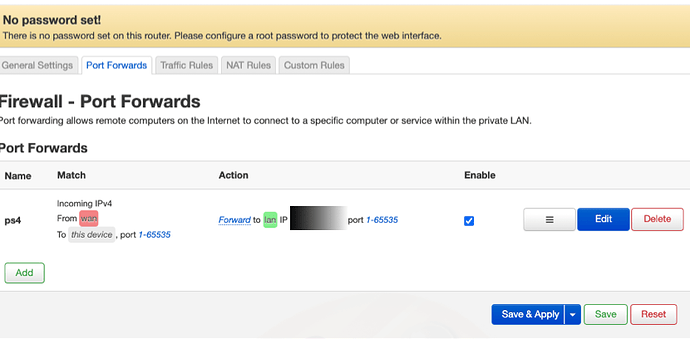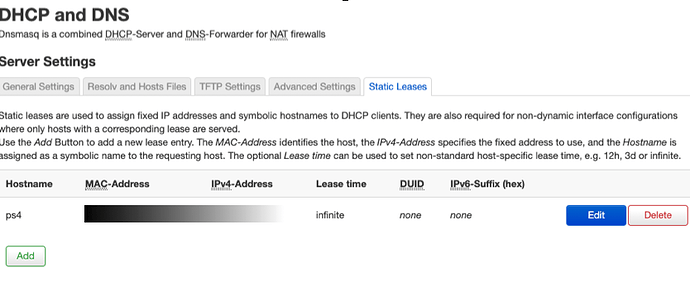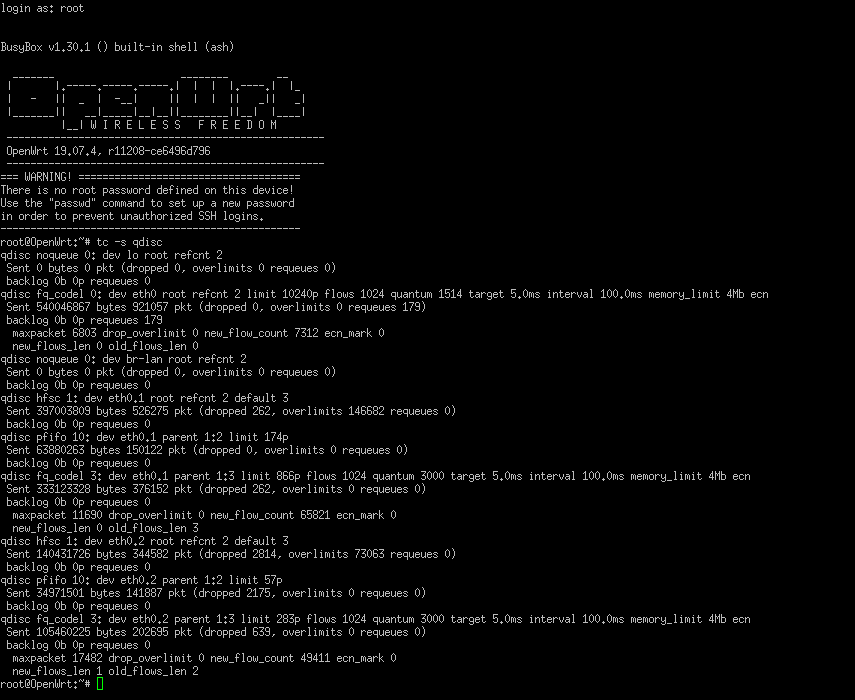Hello everyone, I present to you the configuration I currently use scripts thanks to the developer for the call of duty game, it seems good, I am not a network specialist but I am very interested in it, I want to clarify that I am not on what I advance and hold myself in no way responsible for what you do with it, i have for that download the package for the script work ... what do you think ?
#!/bin/sh
## "atm" for old-school DSL or change to "DOCSIS" for cable modem, or "other" for everything else
LINKTYPE="other"
WAN=eth0.2 # change this to your WAN device name
UPRATE=17000 #change this to your kbps upload speed
LAN=eth0.1
DOWNRATE=52000 #change this to about 80% of your download speed (in kbps)
## how many kbps of UDP upload and download do you need for your games
## across all gaming machines?
GAMEUP=450
GAMEDOWN=1200
## set this to "pfifo" or if you want to differentiate between game
## packets into 3 different classes you can use either "drr" or "qfq"
## be aware not all machines will have drr or qfq available
gameqdisc="pfifo"
GAMINGIP="192.168.2.XXX" ## change this
cat <<EOF
This script prioritizes the UDP packets from / to a set of gaming
machines into a real-time HFSC queue with guaranteed total bandwidth
Based on your settings:
Game upload guarantee = $GAMEUP kbps
Game download guarantee = $GAMEDOWN kbps
Download direction only works if you install this on a *wired* router
and there is a separate AP wired into your network, because otherwise
there are multiple parallel queues for traffic to leave your router
heading to the LAN.
Based on your link total bandwidth, the **minimum** amount of jitter
you should expect in your network is about:
UP = $(((1500*8)*3/UPRATE)) ms
DOWN = $(((1500*8)*3/DOWNRATE)) ms
In order to get lower minimum jitter you must upgrade the speed of
your link, no queuing system can help.
Please note for your display rate that:
at 30Hz, one on screen frame lasts: 33.3 ms
at 60Hz, one on screen frame lasts: 16.6 ms
at 144Hz, one on screen frame lasts: 6.9 ms
This means the typical gamer is sensitive to as little as on the order
of 5ms of jitter. To get 5ms minimum jitter you should have bandwidth
in each direction of at least:
$((1500*8*3/5)) kbps
The queue system can ONLY control bandwidth and jitter in the link
between your router and the VERY FIRST device in the ISP
network. Typically you will have 5 to 10 devices between your router
and your gaming server, any of those can have variable delay and ruin
your gaming, and there is NOTHING that your router can do about it.
EOF
setqdisc () {
DEV=$1
RATE=$2
OH=26
MTU=1500
highrate=$((RATE*90/100))
lowrate=$((RATE*10/100))
gamerate=$3
useqdisc=$4
tc qdisc del dev "$DEV" root
case $LINKTOP in
"atm")
tc qdisc replace dev "$DEV" handle 1: root stab mtu 2047 tsize 512 mpu 68 overhead ${OH} linklayer atm hfsc default 3
;;
"DOCSIS")
tc qdisc replace dev $DEV stab overhead 25 linklayer ethernet handle 1: root hfsc default 3
;;
*)
tc qdisc replace dev $DEV stab overhead 40 linklayer ethernet handle 1: root hfsc default 3
;;
esac
#limit the link overall:
tc class add dev "$DEV" parent 1: classid 1:1 hfsc ls m2 "${RATE}kbit" ul m2 "${RATE}kbit"
# high prio class
tc class add dev "$DEV" parent 1:1 classid 1:2 hfsc rt m1 "${highrate}kbit" d 80ms m2 "${gamerate}kbit"
# other prio class
tc class add dev "$DEV" parent 1:1 classid 1:3 hfsc ls m1 "${lowrate}kbit" d 80ms m2 "${highrate}kbit"
## set this to "drr" or "qfq" to differentiate between different game
## packets, or use "pfifo" to treat all game packets equally
REDMIN=$((gamerate*30/8)) #30 ms of data
REDMAX=$((gamerate*200/8)) #200ms of data
case $useqdisc in
"drr")
tc qdisc add dev "$DEV" parent 1:2 handle 2:0 drr
tc class add dev "$DEV" parent 2:0 classid 2:1 drr quantum 8000
tc qdisc add dev "$DEV" parent 2:1 handle 10: red limit 150000 min $REDMIN max $REDMAX probability 1.0
tc class add dev "$DEV" parent 2:0 classid 2:2 drr quantum 4000
tc qdisc add dev "$DEV" parent 2:2 handle 20: red limit 150000 min $REDMIN max $REDMAX probability 1.0
tc class add dev "$DEV" parent 2:0 classid 2:3 drr quantum 1000
tc qdisc add dev "$DEV" parent 2:3 handle 30: red limit 150000 min $REDMIN max $REDMAX probability 1.0
## with this send high priority game packets to 10:, medium to 20:, normal to 30:
## games will not starve but be given relative importance based on the quantum parameter
;;
"qfq")
tc qdisc add dev "$DEV" parent 1:2 handle 2:0 qfq
tc class add dev "$DEV" parent 2:0 classid 2:1 qfq weight 8000
tc qdisc add dev "$DEV" parent 2:1 handle 10: red limit 150000 min $REDMIN max $REDMAX probability 1.0
tc class add dev "$DEV" parent 2:0 classid 2:2 qfq weight 4000
tc qdisc add dev "$DEV" parent 2:2 handle 20: red limit 150000 min $REDMIN max $REDMAX probability 1.0
tc class add dev "$DEV" parent 2:0 classid 2:3 qfq weight 1000
tc qdisc add dev "$DEV" parent 2:3 handle 30: red limit 150000 min $REDMIN max $REDMAX probability 1.0
## with this send high priority game packets to 10:, medium to 20:, normal to 30:
## games will not starve but be given relative importance based on the weight parameter
;;
*)
PFIFOLEN=$((1 + 40*RATE/(MTU*8))) # at least 1 packet, plus 40ms worth of additional packets
tc qdisc add dev "$DEV" parent 1:2 handle 10: pfifo limit $PFIFOLEN
## send game packets to 10:, they're all treated the same
;;
esac
if [ $((MTU * 8 * 10 / RATE > 50)) -eq 1 ]; then ## if one MTU packet takes more than 5ms
echo "adding PIE qdisc for non-game traffic due to slow link"
tc qdisc add dev "$DEV" parent 1:3 handle 3: pie limit $((RATE * 200 / (MTU * 8))) target 80ms ecn tupdate 40ms bytemode
else ## we can have queues with multiple packets without major delays, fair queuing is more meaningful
echo "adding fq_codel qdisc for non-game traffic due to fast link"
tc qdisc add dev "$DEV" parent 1:3 handle 3: fq_codel limit $((RATE * 200 / (MTU * 8))) quantum $((MTU * 2))
fi
}
setqdisc $WAN $UPRATE $GAMEUP $gameqdisc
## uncomment this to do the download direction via output of LAN
setqdisc $LAN $DOWNRATE $GAMEDOWN $gameqdisc
## we want to classify packets, so use these rules
cat <<EOF
We are going to add classification rules via iptables to the
POSTROUTING chain. You should actually read and ensure that these
rules make sense in your firewall before running this script.
Continue? (type y or n and then RETURN/ENTER)
EOF
read -r cont
if [ "$cont" = "y" ]; then
iptables -t mangle -F POSTROUTING
iptables -t mangle -A POSTROUTING -j CLASSIFY --set-class 1:3 # default everything to 1:3, the "non-game" qdisc
if [ "$gameqdisc" = "pfifo" ]; then
iptables -t mangle -A POSTROUTING -p udp -s ${GAMINGIP} -j CLASSIFY --set-class 1:2
iptables -t mangle -A POSTROUTING -p udp -d ${GAMINGIP} -j CLASSIFY --set-class 1:2
else
echo "YOU MUST PLACE CLASSIFIERS FOR YOUR GAME TRAFFIC HERE"
echo "SEND TRAFFIC TO 2:1 (high) or 2:2 (medium) or 3:3 (normal)"
fi
else
cat <<EOF
Check the rules and come back when you're ready.
EOF
fi
echo "DONE!"
tc -s qdisc




